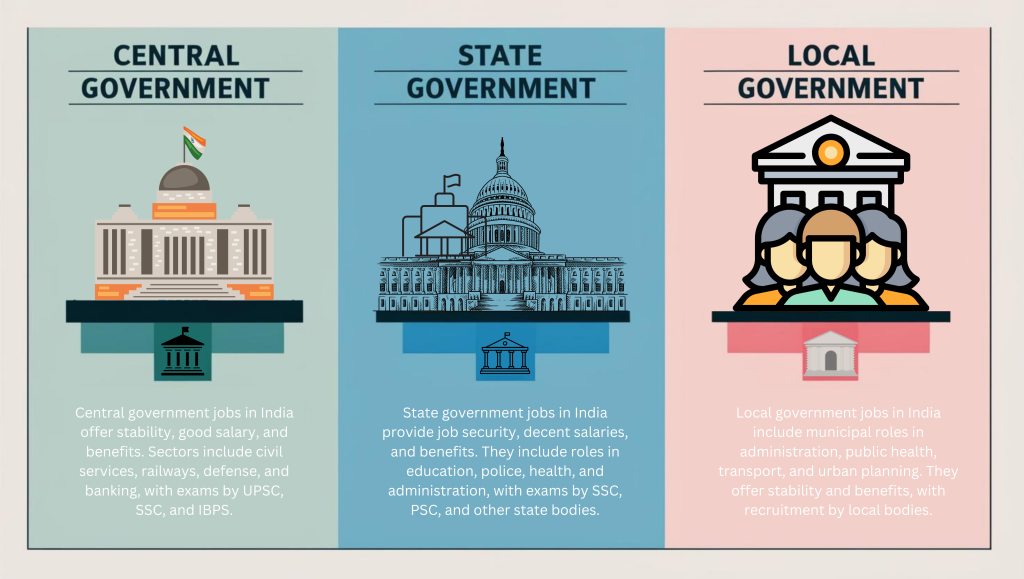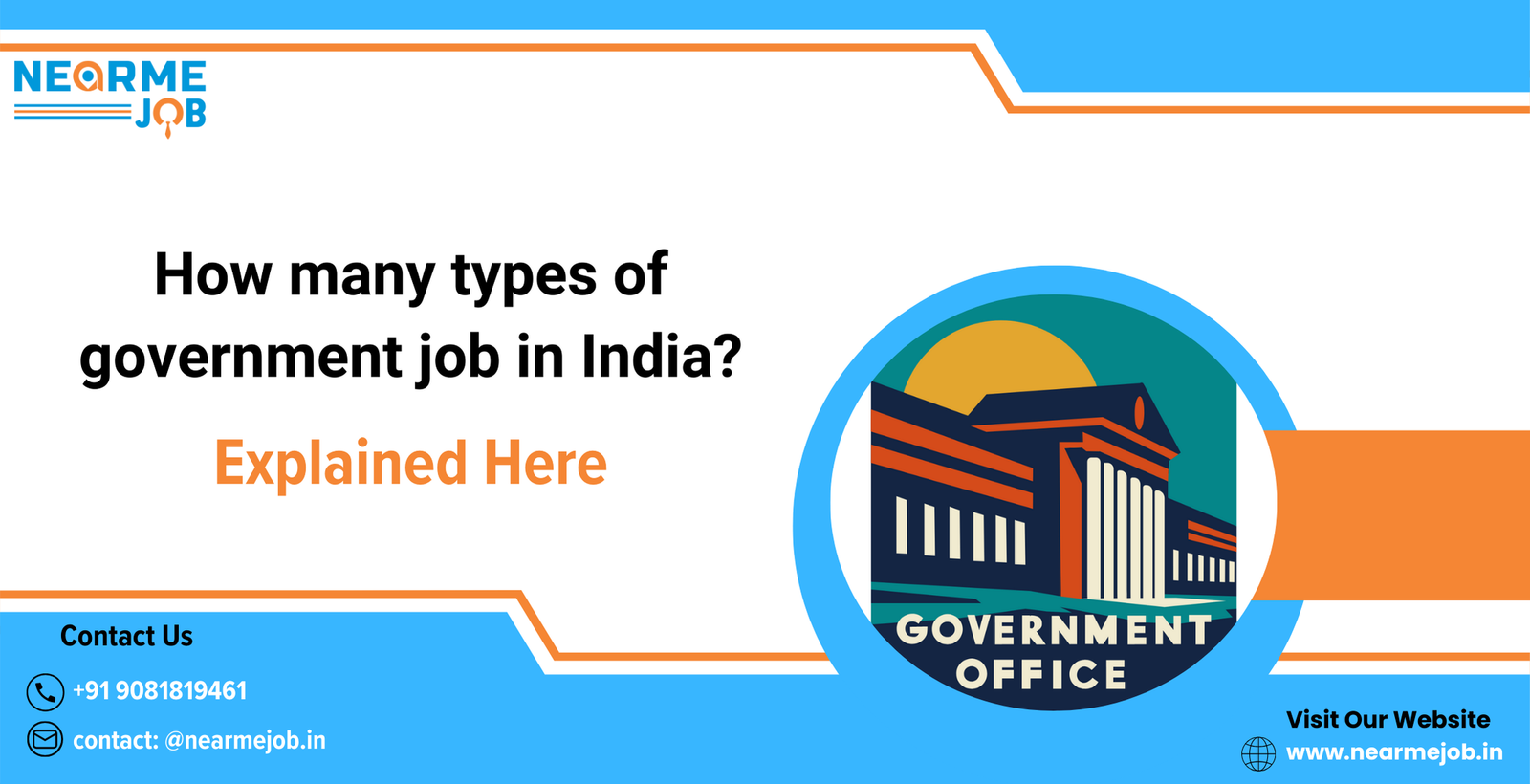How many types of government job in India? Explained Here
For millions of Indians, a government job isn’t just a career, it’s a lifelong dream. The promise of stability, respect, and a chance to serve the nation has made these roles a cornerstone of aspiration.
From the bustling streets of Mumbai to the quiet villages of Assam, the question echoes: “How many types of government job in India?”
Let’s unravel this vast ecosystem, where opportunities span from filing paperwork in district offices to launching satellites into space.
Introduction to Government Jobs in India

Imagine a young graduate in Bihar preparing for the UPSC exams at a cramped coaching centre, or a tech-savvy engineer in Hyderabad eyeing a role at ISRO. Government jobs in India unite ambition with a sense of duty.
These roles span sectors as varied as education, defence, and space research, offering not just job security but also the chance to shape the nation’s future.
How Many Government Jobs Are There in India?
India’s government sector is colossal, employing over 20 million people across central, state, and local bodies. Here’s a breakdown:
- Central Government: Employs ~4.5 million (including railways, defence, and ministries).
- State Governments: Over 10 million jobs (teachers, police, healthcare workers).
- Local Bodies: ~3.5 million roles (municipal staff, panchayat secretaries).
- Public Sector Undertakings (PSUs): ~1.5 million jobs in companies like ONGC and SAIL.
However, demand far outstrips supply. For instance, UPSC’s 2023 Civil Services Exam saw 11.5 lakh applicants competing for just 1,105 vacancies. This fierce competition reflects the enduring allure of government jobs in India.
Categories of Government Jobs: The Three-Tier Framework
India’s government jobs operate like a layered cake, divided into three tiers:
Central Government Jobs:
The crown jewels of bureaucracy! Think IAS officers shaping policies, scientists at ISRO, or RBI bankers managing the economy. These roles are governed by national agencies like UPSC or SSC and offer pan-India postings.
State Government Jobs:
Closer to home, state jobs let you impact your region. Become a state civil service officer, a school teacher in Punjab, or a nurse in Tamil Nadu’s health department. Each state conducts its own exams (e.g., MPSC, TNPSC).
Local Government Jobs:
Grassroots heroes thrive here. Municipal clerks, village development officers, or Anganwadi workers, these roles connect directly with communities, often requiring no high-stakes exams but offering immediate local impact.
What Are the Different Types of Government Jobs in India?
Government roles in India are as diverse as the nation itself. Here’s a snapshot:
By Sector:
- Administrative Services: IAS, IPS, IFS (policy-making, law enforcement).
- Banking & Finance: RBI, SBI, NABARD (monetary policies, rural development).
- Defence: Army, Navy, Air Force, BSF, CRPF (national security).
- Education: Teachers, professors, researchers (UGC NET, CTET).
- Engineering & Tech: ISRO, DRDO, PWD (innovation and infrastructure).
- Law & Judiciary: Judges, public prosecutors (Judicial Services Exams).
- Healthcare: Doctors, nurses (AIIMS, state health departments).
Also Read This Blog ➡ Top 10 Competitive Exam Books for Government Job Aspirants
By Employment Level:
- Gazetted Officers (IAS, IPS): Decision-making authority.
- Non-Gazetted Staff (clerks, assistants): Administrative support roles.
- Contractual & Temporary Roles: Anganwadi workers, ASHA volunteers.
Different Sectors of Government Jobs
Government jobs aren’t just about desks and files. They’re a universe of sectors waiting to match your skills:
- (a) Administrative Services (Civil Service)
The “steel frame” of India. IAS, IPS, and IFS officers lead districts, enforce laws, or represent India globally. UPSC’s Civil Services Exam (CSE) is the golden ticket. - (b) Banking & Financial Sector
From managing accounts in SBI to regulating policies at RBI, this sector blends finance with public service. Exams like IBPS and RBI Grade-B open doors. - (c) Railway Jobs (RRB)
India’s lifeline employs over 1.2 million people! Engineers, ticket collectors, or technicians—RRB exams recruit for roles that keep trains chugging. - (d) Defence & Paramilitary Forces
Serve on the frontlines. Join the Army, Navy, Air Force, or paramilitary forces like CRPF and BSF. Exams like NDA, CDS, or CAPF rally the bravest. - (e) Teaching & Education
Shape young minds as a government school teacher (via CTET) or university professor (through UGC NET). States also hire lecturers for colleges. - (f) Public Sector Undertakings (PSUs)
Work with giants like ONGC or BHEL. Engineers and management graduates thrive here via GATE or PSU-specific exams. - (h) Law & Judiciary
Fight for justice as a judge, public prosecutor, or legal advisor. Judicial services exams or CLAT pave the way. - (i) Engineering & Technical Jobs
Build India’s future! PWD engineers, DRDO scientists, or NIC developers—roles filled via ESE (Engineering Services Exam) or state tests. - (j) Research & Scientific Jobs
Innovate at ISRO, CSIR, or ICAR. PhD holders and researchers tackle climate change, space missions, and agricultural reforms. - (k) Postal & Communication
India Post delivers more than mail—it delivers jobs! Postmen, postal assistants, and communication engineers keep the country connected. - (l) Police & Investigation Agencies
Solve mysteries with CBI, protect borders with ITBP, or maintain order as a state police constable. Physical tests and written exams filter the best. - (m) Government Clerical & Support Staff
The backbone of offices. SSC recruits clerks, stenographers, and data entry operators—roles perfect for those seeking steady, low-pressure work.
Exam-Wise Classification of Government Jobs
- UPSC Exams: Civil Services, CAPF, ESE.
- SSC Exams: CGL, CHSL, Stenographer.
- Banking Exams: IBPS PO, SBI Clerk.
- Railway Exams: RRB NTPC, ALP.
- Teaching Exams: CTET, UGC NET.
- State Exams: TNPSC, MPSC, WBCS.
FAQs on How many types of government job in India?
What Are Group A and Group B Jobs?
The Central Civil Services classify jobs into Group A (elite) and Group B (mid-level) categories:
Group A (Class I) Jobs
- Roles: Policy formulation, leadership (IAS, IPS, IFS, scientists at ISRO).
- Recruitment: Via UPSC exams (Civil Services, Engineering Services).
- Perks: Higher salaries, government housing, prestige.
Group B (Class II) Jobs
- Roles: Implementation of policies (Section Officers, Tax Inspectors, State Police Services).
- Recruitment: SSC exams (CGL, CHSL) or state-level PSCs.
- Growth: Can be promoted to Group A after years of service.
What Is Grade 4 in Government Jobs?
Grade 4 (formerly Group D) roles are entry-level positions requiring minimal qualifications (often Class 10 or below). These jobs form the backbone of daily operations:
- Roles: Peons, drivers, sanitation staff, office attendants.
- Recruitment: State-level exams or SSC’s Multi-Tasking Staff (MTS) tests.
- Importance: They ensure offices, schools, and hospitals function smoothly.
Under the 7th Pay Commission, Grade 4 employees earn between ₹18,000 to ₹29,000 monthly, with job security and pension benefits.
For instance, a railway gangman maintaining tracks or a school peon managing logistics plays a vital, if unsung, role in India’s growth.
How to Apply for Government Jobs?
- Stay Alert: Follow official websites (Sarkari Naukri, UPSC.gov.in and NearmeJob) or job portals.
- Notifications: Check eligibility (age, education), deadlines, and exam patterns.
- Apply Online: Fill forms carefully—upload photos, signatures, and certificates.
- Prep Smartly: Join coaching, attempt mock tests, and revise current affairs.
- Interviews: For roles like IAS or IFS, the personality test is your moment to shine.
Which Government Job is Best for You? Ask Yourself…?
- Skills: Love numbers? Try banking. Passionate about social issues? Civil services.
- Lifestyle: Defence jobs demand physical rigor; clerical roles offer predictable hours.
- Impact: PSU engineers innovate infrastructure, while teachers mold future generations.
[html_block id=”238″]


Pingback: How to Become a Government Teacher After 12th Easily